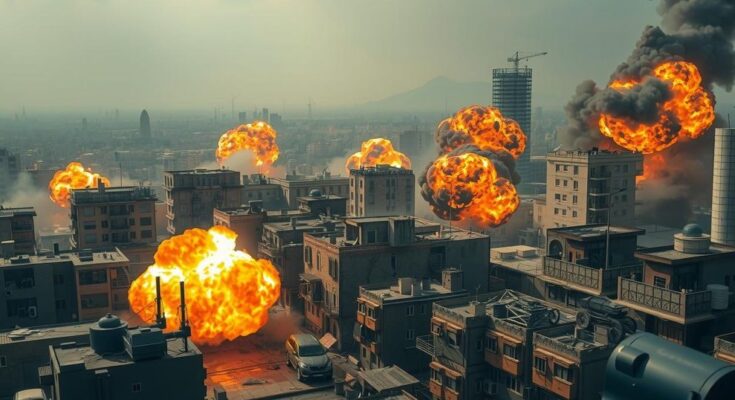Israel has conducted airstrikes in and around Tehran, reported as retaliation for ongoing Iranian attacks on Israeli interests. This complex military engagement spans multiple nations, raising concerns over the possible escalation of conflict in the region, with U.S. peace groups urging for diplomatic resolutions to avoid further entanglement.
On Saturday, Israeli military operations expanded to target sites within Iran, as numerous explosions were reported in and around Tehran, with further incidents noted in Syria and Iraq. The Israel Defense Forces (IDF) conducted these strikes under the assertion of retaliating against “months of continuous attacks” from Iranian forces. IDF spokesperson Rear Adm. Daniel Hagari stated, “The regime in Iran and its proxies in the region have been relentlessly attacking Israel since October 7th—on seven fronts—including direct attacks from Iranian soil.” The attacks reportedly struck various strategic locations, including the Imam Khomeini International Airport and the headquarters of the Islamic Revolutionary Guards Corps (IRGC). These developments come amid an ongoing conflict involving Israel and several nations, including Palestine, Lebanon, and its recent escalations into Iranian territory. In response, Iranian officials reported initiating missile strikes targeting Israel, depicting the actions as retaliation for the killing of key leaders of Hezbollah and Hamas. This ongoing military engagement signifies a troubling pattern, with the potential for regional escalation as calls for the United States to avoid involvement are echoed by peace advocates. U.S. sources affirmed awareness of Israel’s recent military maneuvers, emphasizing the need for a diplomatic approach rather than continued military support. “The U.S. should stay out of the conflict between Israel and Iran,” stated Massachusetts Peace Action executive director Brian Garvey, cautioning against further escalation. As the situation unfolds, concerns regarding military actions affecting a broader spectrum of nations remain critical, highlighting the urgency for diplomatic intervention and the pursuit of ceasefire agreements in the region.
The recent escalation of hostilities in the Middle East, particularly involving Israel, Iran, and several neighboring countries, reflects a complex geopolitical landscape marked by longstanding tensions, territorial disputes, and deep-rooted animosities. Israel has historically engaged in military actions against perceived threats from militant groups in the region, primarily Hezbollah and Hamas, as well as state actors like Iran that support these organizations. The current conflict follows a period of heightened violence that began in October 2023, further intensified by the Israeli assault on Gaza. The involvement of multiple nations complicates the situation, signaling the potential for a broader regional conflict. This backdrop informs the urgency of calls from peace organizations advocating for U.S. non-involvement and for diplomatic resolutions to prevent escalation.
In summary, the situation in the Middle East is increasingly precarious as Israel extends its military operations into Iranian territory, exacerbating an already volatile conflict involving multiple nations. The ongoing military engagements, as communicated by Israeli officials, aim to respond to perceived threats from Iran. However, peace advocates warn against U.S. involvement that could lead to further escalation, emphasizing the necessity for diplomatic solutions to ensure a ceasefire and stability in the region. As this conflict unfolds, the international community watches closely to gauge the potential outcomes and ramifications of these military actions.
Original Source: www.commondreams.org




